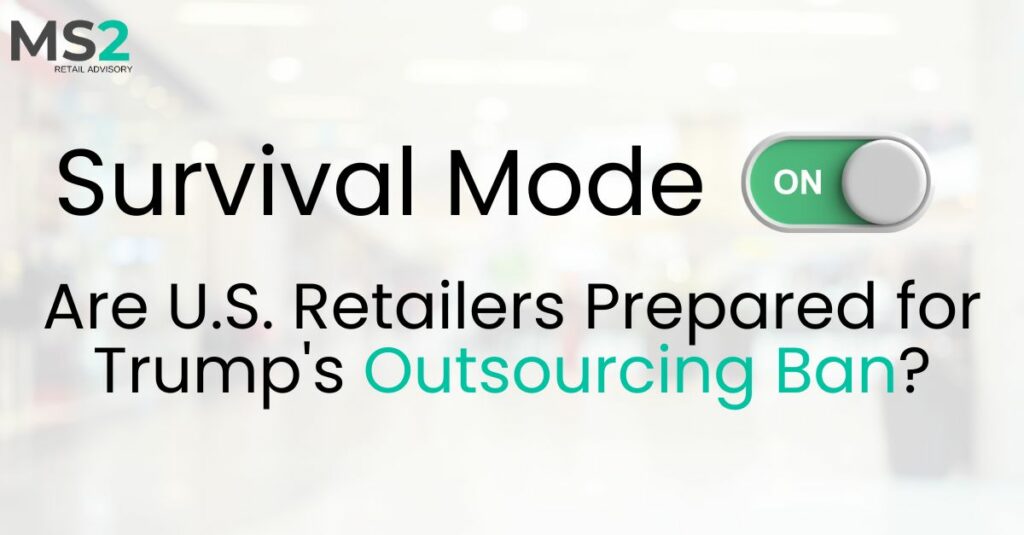If Donald Trump is re-elected and makes good on his promise to end outsourcing, it could have big consequences for the U.S. retail industry and businesses across the country. Trump’s plan to “stop outsourcing and make the U.S. a manufacturing superpower” could force many retailers and businesses to change how they operate, leading to higher costs and possibly even changing how they do business entirely.
During his 2024 campaign, Trump laid out 20 key promises as part of his “Make America Great Again [MAGA]” vision. These promises are centered on putting America First, with a strong focus on keeping jobs and production within the U.S.
Some of the major promises include:
- Sealing the border
- Carrying out a large-scale deportation program
- Preventing World War Three
- Cutting taxes for workers
- Ending inflation
- Building the world’s strongest military
- Bringing peace to Europe and West Asia
- Keeping the dollar as the world’s reserve currency
However, the promise that’s raising concerns among U.S. retailers and businesses is his vow to end outsourcing. This promise harks back to his first term (2017–2021), when Trump introduced policies aimed at reducing outsourcing, particularly from Indian companies that dominate the U.S. market. The Indian outsourcing industry relies heavily on U.S. businesses, with American companies making up 62% of their global clientele. Big U.S. brands like Ford, Cisco, Amex, GE, and Microsoft have historically outsourced various services to India to keep costs down and maintain efficiency.
For U.S. retailers and businesses, Trump’s proposed changes could mean a need to rethink their strategies. Outsourcing has been a key way for many companies to manage costs, particularly for services like customer support, IT, and back-office operations. If these services have to be brought back to the U.S., it could lead to significantly higher operational costs. This might force retailers to raise prices, cut back on investments, or even downsize to maintain their profitability.
What U.S. Retailers and Businesses Might Face:
- Higher Operational Costs: Bringing outsourced services like customer support, IT, and other back-office functions back in-house could lead to much higher costs for labor and operations.
- Increased Prices: To cover these higher costs, businesses might have to raise prices on their products, which could impact their competitiveness in the market.
- Supply Chain Disruptions: Shifting away from international suppliers could disrupt supply chains, leading to potential delays and higher costs for raw materials and goods.
- Re-evaluation of Business Models: Retailers and businesses might need to reconsider their business models, including how they produce and deliver goods and services, to adapt to a new cost structure.
- Reduced Profit Margins: With rising costs, businesses may see their profit margins shrink, forcing them to make tough decisions about where to cut back or how to innovate.
- Pressure on Small Businesses: Smaller retailers and businesses, which often rely on cost-effective outsourcing to stay competitive, could be particularly hard hit, possibly leading to closures or consolidation.
- Challenges in Scaling Operations: Companies that rely on outsourcing to scale quickly might find it harder to grow, potentially limiting their expansion plans or ability to enter new markets.
- Impact on Global Competitiveness: U.S. businesses might struggle to compete with international companies that continue to benefit from lower-cost outsourcing, putting them at a disadvantage in the global market.
- Talent Shortages: Finding and training domestic workers to replace outsourced positions could be challenging, especially for specialized roles, leading to potential skill gaps and slower operations.
- Innovation Slowdown: Without access to global talent pools and cost-effective services, businesses might find it harder to invest in innovation, slowing down the development of new products and services.
The uncertainty surrounding these potential changes could make planning difficult for businesses, as they might hesitate to invest in new projects or expansions. This could lead to a more cautious approach to growth, with companies focusing on survival rather than innovation.
While criticism of outsourcing is not new among U.S. presidents, Trump’s rhetoric and actions suggest that his administration could take more drastic measures than previous leaders. Both Joe Biden and Barack Obama also spoke against offshoring, but Trump’s specific focus on ending outsourcing, combined with his America First agenda, signals a potential shift that could affect the entire business landscape in the U.S.
As U.S. retailers and businesses brace for the possibility of a Trump-led crackdown on outsourcing, they may need to rethink their strategies and find new ways to maintain profitability and competitiveness in a potentially higher-cost environment.

